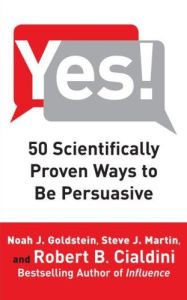Join getAbstract to access the summary!

Join getAbstract to access the summary!
Noah J. Goldstein, Steve J. Martin and Robert B. Cialdini
Yes!
50 Scientifically Proven Ways to Be Persuasive
Free Press, 2008
What's inside?
Would you like to be more persuasive? Yes! Start with this witty, practical collection of tips.
Recommendation
Yes! is an entertaining book – to match the title, it’s a blast! Noah J. Goldstein, Steve J. Martin and Robert B. Cialdini provide, as the subtitle indicates, 50 distinct examples, explanations or techniques to help you become more persuasive. They present the general principles of persuasion and discuss an abundance of specific, detailed uses. The authors offer numerous studies (their own and others’), hypothetical situations, and elucidations of what to do and what not to do. They advocate the idea that you can and should test persuasive strategies. They are convincing, and they write wittily and breezily. getAbstract recommends this useful book to anyone engaged in persuasion, including executives, marketers, trainers and salespeople.
Summary
About the Authors
Noah J. Goldstein teaches at the UCLA Anderson School of Management. Psychologist Robert B. Cialdini also wrote Influence and Principles of Ethical Influence. Steve J. Martin is managing director and Cialdini is president of a consultancy that helps organizations improve performance by using the principles of influence.



















Comment on this summary